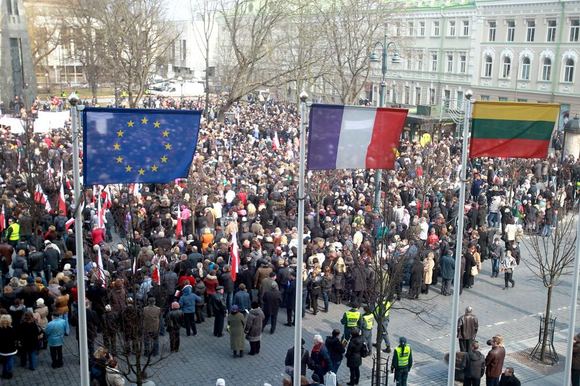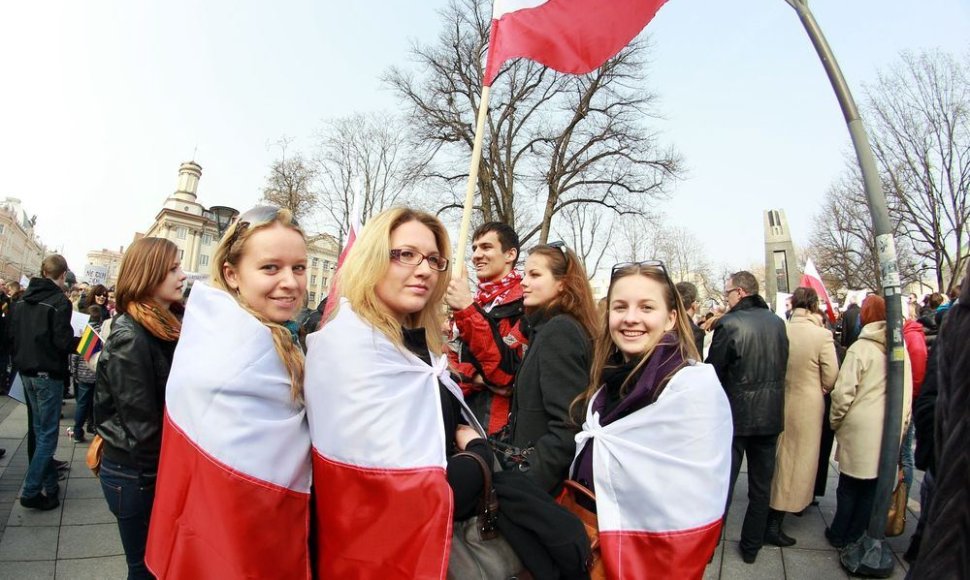According to the police, around 3,000-3,500 people took part in the protest, even though the Vilnius Municipality authorized an event of up to 2,000. Protesters were holding flags of Lithuania, Poland, the EU, and the Electoral Action of Poles in Lithuania, the main political representatives of Polish minority. Banners read "Stop to Destruction of Ethnic Minority Education" and "We Will Defend Ethnic Minority Education in Lithuania".
Protesters gathered outside the parliament and later marched towards the Office of the Government, where they held a rally. The police have not reported any serious incidents. Before the event, they stopped a man wearing an armband with swastika.
Albertas Norvaišas, coordinator of the Polish Schools of Lithuania Strike Committees, said the protesters only want to preserve their national culler and the right to receive education in native tongue. "The protest action marks the first anniversary of the Education Law. We will fight until the end, defend our schools, so that in twenty years, our children can thank us for a chance to learn in their native language," he said.
Protesters also said reforms "are destroying the Lithuanian education system" and the ethnic minority education model.
They demand cancelation of certain new provisions, including obligations for national minority school graduates to take the same Lithuanian exam as native speakers. Also among the demands are the inclusion of a mother tongue exam (Polish, Russian, Belarusian) into the list of compulsory final exams, revoking the allegedly discriminatory provision on the maintenance of state language schools at the expense of ethnic minority schools, and increasing funding for ethnic minority schools.
Before the event, there were talks about Poland's nationalist groups coming to support the action. The organizers have denied the rumors, saying it was just a media hoax. However, there were messages on Polish nationalist groups' websites, inviting people to come to Vilnius and announcing that at least one bus would be taking people from Warsaw.
The Lithuanian parliament adopted a new Law on Education a year ago extending the use of the Lithuanian language in ethnic minority schools and introducing a unified exam in Lithuanian for Lithuanian and ethnic minority schools as of 2013.
The Lithuanian government claims the chosen model is one of the most moderate in Europe and underlines that similar provisions regarding unified examination and classes in a state language are in place in other countries, including Poland.
Way to build up political capital
One should not build political capital at the expense of children's education, Lithuanian Minister of Education and Science, Gintaras Steponavičius, said on Saturday.
"Recent protests, especially the ones held last fall, are to a large extent motivated by political goals. If someone believes they can build political capital at the expense of children's education, then they are doing children an ill service," the minister told BNS.
In his words, since the new Law on Education was adopted last year, quite a number of decisions have been made aimed at relaxing requirements for ethnic minorities. For example, conditions have been created for teachers to raise their qualifications, a more relaxed school network for ethnic minorities has been confirmed and different criteria for the evaluation of the Lithuanian-language exam have been laid out.
Steponavičius also said a bigger number of Lithuanian-language classes have been introduced in the majority of ethnic minority schools, and the process is taking place smoothly.
"Lithuanian-language classes are additional, and education in ethnic minority languages is not being restricted," the minister underlined.
Steponavičius noted that problems arise in the municipalities whose representatives are building political capital out of education, especially as general elections are approaching.
"It has been and will be unacceptable to involve schools, pupils, and that is done at the expense of children's education," Steponavičius said, reminding that a special working group for ethnic minority education issues has been set up at the Ministry of Education and Science, and it should discuss and solve the most sensitive issues.
"My suggestion would be to choose an efficient way to solve education issues," the minister said.
 |
| Irmanto Gelūno/15min.lt nuotr. |




















